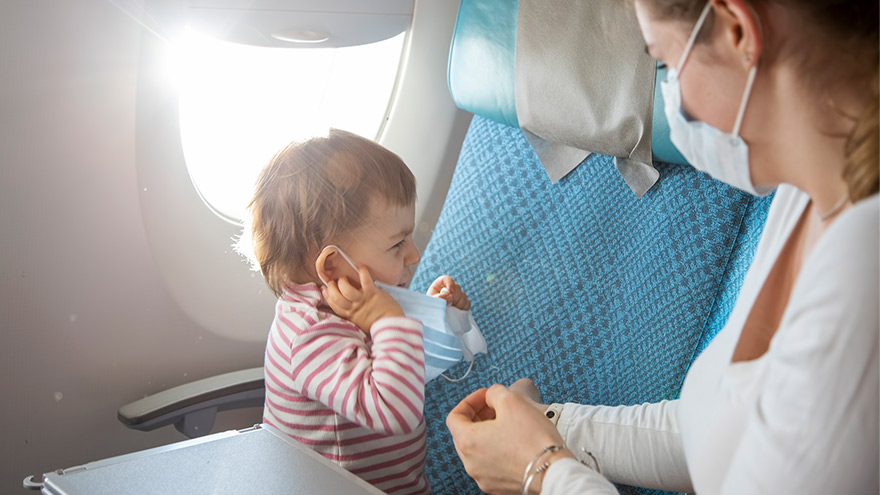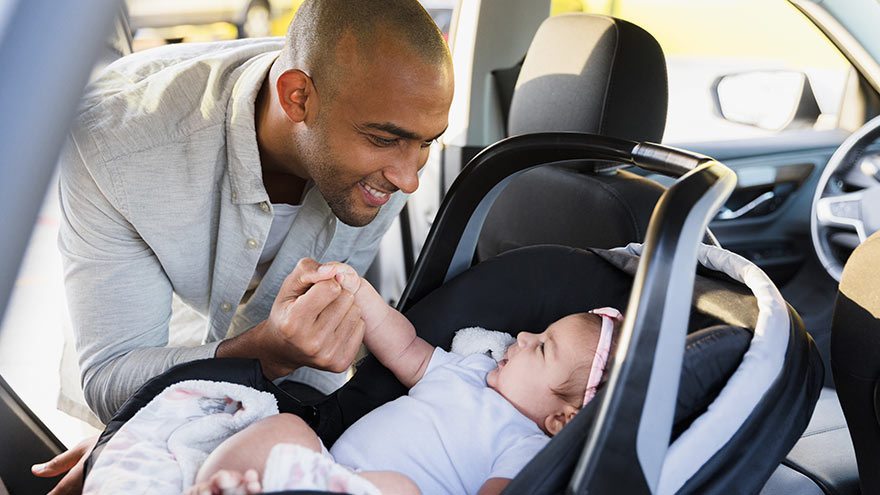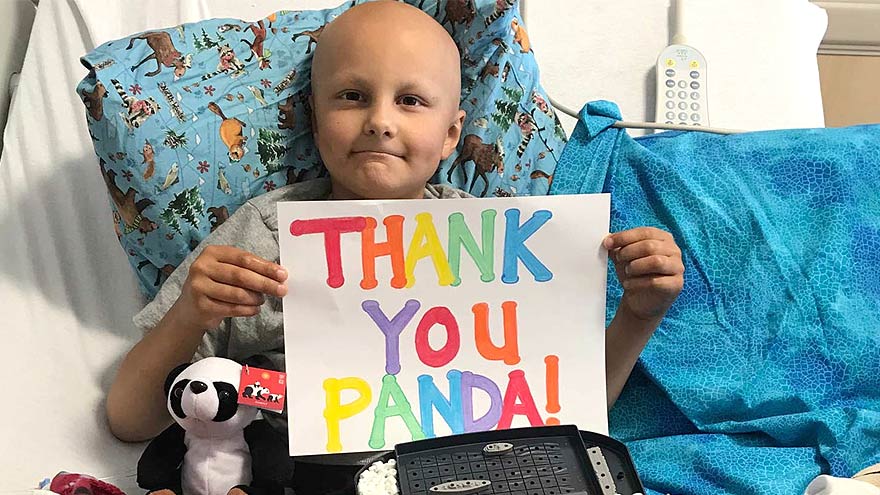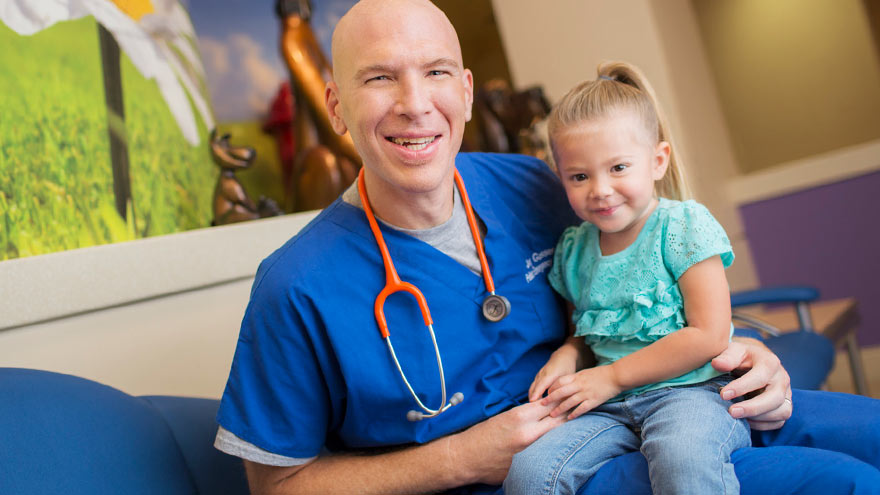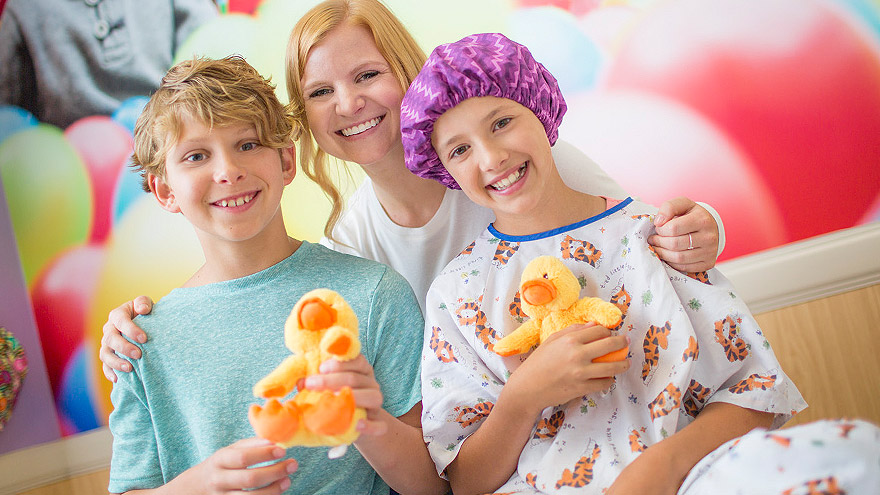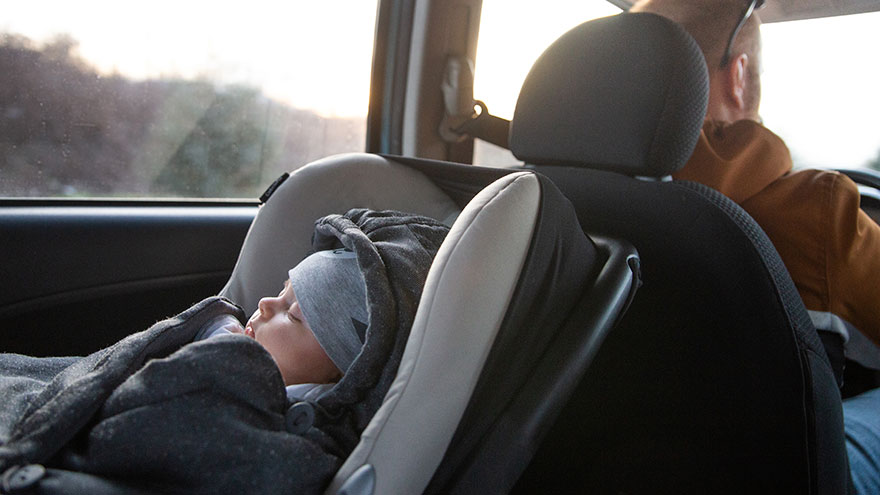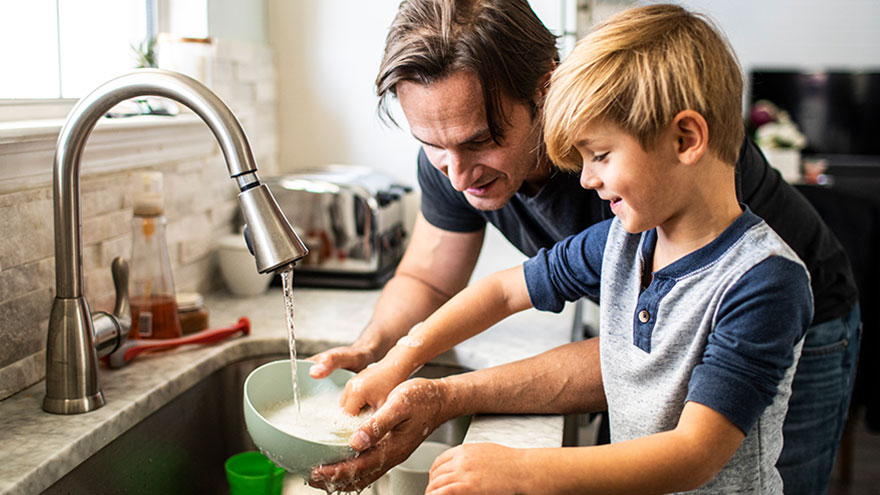Search
-
Baby's Ears and Altitude Changes
One of the best things about living in the Reno area is the beautiful mountain range that surrounds our city. Many families take advantage of the activities the mountains have to offer or travel over them to visit friends and family in neighboring areas. However, for parents of infants there is often angst over your baby’s ears and altitude changes and the associated potential for ear pain and/or “popping.” Fortunately, there are things you can do to protect your infant’s ears the next time you drive over the mountain or hop on a plane with your little one. Baby’s Ears and Altitude Changes: What Causes Them to “Pop” The simple answer is pressure. The problem originates in the middle ear where there is an air pocket that is vulnerable to changes in pressure. The Eustachian tube, which runs behind the nose to the middle ear, is constantly absorbing and resupplying air to this pocket to keep it balanced. When the pressure is not balanced, your ears feel “clogged” or like they need to “pop.” In some cases this sensation can cause significant ear pain and even temporary hearing loss. Rapid changes in elevation or altitude, like driving over a mountain, or ascending or descending on an airplane, can cause rapid changes in pressure. In order to avoid problems, the Eustachian tube needs to open widely and frequently to equalize those pressure changes. The problem often intensifies during descents as you go from an area of lower atmospheric pressure to an area of higher atmospheric pressure. This is why you hear babies screaming on planes during descent or why your infant is wailing in the car seat as you head down the mountain. What can you do to make it a more comfortable trip for your child? First, be prepared. Babies cannot intentionally “pop” their ears like adults can, but we can help them by encouraging them to swallow. Offer your baby a pacifier or bottle while making ascents and descents. If possible, it may be helpful to have an adult ride in the back seat with baby if you’re in the car to ensure this can happen. Don’t let your baby sleep during descent on a plane. Help your little traveler out by offering him or her a pacifier during this process, as descent is the most likely time for pain associated with altitude changes. If your baby is congested prior to travel involving altitude changes, seek the advice of your pediatrician since they may have other solutions, including medications such as decongestants. If you return from a trip and notice your infant is still fussy and uncomfortable, contact your child’s doctor for a thorough ear evaluation. Safe travels!
-
What is Disordered Drinking?
An alcohol problem can affect anyone at any age. Many factors, including job stress, genetics or depression, may contribute to the start of disordered drinking. Drinking alcohol exists on a continuum. For example, if someone feels down in the dumps for some time, it doesn’t mean they are clinically depressed. So if someone goes through a period with above-normal alcohol consumption, it doesn’t necessarily mean they abuse alcohol. Although “alcoholic” and “alcoholism” are common, they are not clinical descriptions. Alcohol use disorder is the preferred term. Symptoms are often mild but can be the start of a more significant problem. According to the National Institutes of Health (NIH), over 16 million adults live with alcohol use disorder. Symptoms of Alcohol Use Disorder Do you recognize any of the following symptoms in yourself or someone you know? Drinking more or longer than intended Trying to cut down or stop drinking but not able to Having to drink more than you once did to get the same feeling Being annoyed when family members discuss your drinking Regretting your behavior while you were drinking
-
2 Dangerous Car Seat Mistakes and Solutions
Car seat mistakes can have very serious consequences. Misuse of a car seat can injure your child, or fail to keep them safe in the event of a crash. A lot goes into finding the right car seat for your child. With so many factors to consider (including age, weight and height of the child, type and brand of a car seat, cost of the car seat, etc.) it can be easy to forget critical factors. Here are two common mistakes that certified technicians often find when speaking with parents. Mistake #1: Getting a used car seat without knowing its history Why: A used or secondhand car seat can pose several factors that can compromise its safety in a crash. First, car seats expire six to ten years after their date of manufacture, so refer to the car seat's manual for recommended car seat longevity. The safety mechanisms can be compromised if a car seat has been in a crash. So it's crucial to replace your car seat following a collision. Solution: Only use a car seat if you know its history. A new car seat is your best bet, as they are up to date on the latest safety guidelines, and safety mechanisms are up to standard. However, if you are considering a used car seat for your child, please ensure the following: The car seat has never been in a car crash. The car seat isn't expired or outside the manufacturer's recommended longevity. It comes with the car seat manual and has all safety labels, including manufacture date, model number, and use instructions and restrictions. The car seat or any of its parts have not been recalled. The overall state and integrity of the car seat and its parts are undamaged. The carseat or any of its parts have not been recalled and are present and in working order.
-
Panda Cares Center of Hope at Renown Children's Hospital
When you have an ill child in the hospital, it is a stressful event. And Panda Express is helping local families support children who need special care. Their generous donation provides much-needed equipment, programs, and resources via the new Panda Cares Center of Hope, Renown Children’s Specialty Center. Their partnership directly benefits patients and their families! The ‘Panda Cares Center of Hope, Renown’s Children’s Specialty Center’ In fact, this new center provides care to not only children, but also comprehensive support to the entire family. Similarly, it creates an environment that reduces stress, promotes healing, and provides a superior patient and family experience. This facility upholds Panda Express’ mission, vision, and values and its four pillars: to directly help fund the emotional, mental, physical, and spiritual needs of children. This center, the first-ever in northern Nevada, will provide care for children who have chronic conditions. In particular, it offers ongoing treatment, health management, and specialty medical services, including: Nephrology Endocrinology Neurology Pulmonary Infectious Diseases Medical Genetics Adolescent Medicine How You Can Help! When you order from Panda Express, you can opt to round up your change, which will help support programs and services, such as the Center of Hope for Renown Children’s Hospital. Order Online A Partnership for Health & Education of Underserved Youth This partnership allows Renown Children’s Hospital to continue to strengthen regional services and increase Panda’s visibility within our growing community. Last year, 21,930 sick children received care from Renown Children’s Hospital. To date, Panda Express has raised $449,200 in financial support to assist us in providing health and education to every child, regardless of illness, injury, insurance, or ability to pay. Panda Express funds have already supported: Giraffe omni beds for the NICU Ultrasound machine for the Children’s ER Panda warmers and a hand held Accuvein machine Child Life Program to support sick patients and families Meeting room in the Children’s Specialty Center In kind donations, volunteer time and support of local events such as the University of Nevada Reno, Wolf Pack Dance Marathon
Read More About Panda Cares Center of Hope at Renown Children's Hospital
-
How to Get Your Kids to Sleep, Screen-Free
If you’re a parent, you’ve probably been there — the sometimes-nightly struggle to get your little ones off to bed. Elaina Lantrip, an APRN with Renown Pediatrics, offers some tips and explains how your child’s electronics may be getting in the way of a good night’s sleep. These days, kids are consuming media from a very early age on all types of devices — from tablets and phones to TVs. While they can benefit from some media use, it can have a negative impact on bedtime. We asked Elaina Lantrip, an advanced nurse practitioner with Renown Pediatrics, for some advice on downloading a better bedtime routine. What are the most important practices for parents to establish for their children’s bedtime routines? I often have parents tell me that their child won’t go to bed — or to sleep. Parents frequently ask for tips on bedtime routines that work. My first question is whether their regular bedtime routine involves television, iPad, tablet, phone or anything with a screen. It’s very important that bedtime includes a bath, reading a story, talking, singing and bonding with young ones, rather than using any devices. Why shouldn’t children have a device at bedtime? A growing body of research supports that screen time at bedtime contributes to delays in a child’s falling to sleep; overall inability to reach the important REM, or deep sleep; waking up during the night; nightmares and night terrors. For older youth, engaging with social media before bedtime can bring up stresses, emotions and relationship issues with peers that don’t exactly create peaceful bedtime thoughts. Bedtime should be a screen-free, stress-free, peaceful time of day. It’s a great time for parents to promote self-esteem, talk through things going on in the child’s life, to encourage and build them up. Children grow up fast — bedtime is a great the opportunity with younger children to cuddle up and read a story or sing a lullaby. What are other major considerations in making bedtime smooth and relaxing for kids and their parents? Another factor that contributes to positive sleep habits includes children getting enough activity during the the day so they’re genuinely tired at night. Also helpful are ambient noise makers, peaceful music, avoiding sugar two hours prior to bedtime, consistency in bedtime routine, comfortable pajamas and comfortable temperature in the home. Is it important to keep the child’s bedroom dark? Dimming the lights is important, regardless of the time of year. This is another reason to ban screens, as they emit light that stimulates wakefulness.
-
Keeping Pediatric Care Close to Home
As our community grows, so does the need for specialized care. Thanks to a generous gift, there’s a healthier future for families in the region as a $7.5 million gift to the Renown Health Foundation is helping keep care close to home. Being in the hospital is often a stressful experience, especially for a child and their caregivers. If you add the need to travel out-of-state for care into the mix, unnecessary anxiety and financial burdens can be placed on a family that is already worried about a sick child. With our quickly growing community and close to 100,000 children under the age of 18 in Washoe County alone, the need for local specialty care is needed. The William N. Pennington Foundation recognized this need and donated $7.5 million to the Renown Health Foundation – the largest gift the health system has received – to keep care close to home and establish the William N. Pennington Fund for Advanced Pediatric Care. Thanks to this gift, Renown Children’s Hospital has hired more than 15 pediatric specialists who provide care for children in our community. Below, we introduce you to three key specialized pediatricians in northern Nevada: Joseph A. Gassen, M.D. “Having pediatric specialists in the community is invaluable,” says Joseph A. Gassen, M.D., pediatric emergency medicine. “It allows families and patients to stay in Reno and not have to travel far distances to get quality care.” Gassen, the only doctor specializing in pediatric emergency medicine in the region, moved to Reno to provide care in the emergency room at Renown Children’s Hospital. “The hospital is dedicated to improving the care of children in northern Nevada, and I wanted to be a part of this amazing vision," Dr. Gassen says. I would not have been able to relocate to Reno without the support from the hospital and the William N. Pennington gift.” Working with children and their families are what Dr. Gassen finds most rewarding. "I get to provide care for a child, which in turn makes the parent feel better,” he says. “Essentially, I get to treat the whole family, even though I only directly care for the kids.” Colin Nguyen, M.D. Also among the first new specialists is Pediatric Neurologist Colin Nguyen, M.D., who has done extensive work with epilepsy and epilepsy surgery. “In any growing and expanding community, we need the multitude of social, financial, political and well-being services to sustain that growth and progress,” Dr. Nguyen says. “The ability to offer more breadth of medical services to our local population allows families to spend more time together and fulfill work obligations, without the need to travel long distances to obtain that specialized care.” Dr. Nguyen says he enjoys caring for children because they are honest in their emotions and reactions, as well as simple in their intentions. “It is the overall joy and unique sadness that comes in working with children, which drives many of us to continue our work -- I am no exception.” Jacob Zucker, M.D. The third pediatric specialist providing care thanks to the Pennington gift has close ties to northern Nevada. Jacob Zucker, M.D., pediatric hematologist-oncologist, was born and raised in Reno and attended medical school at the University of Nevada, Reno School of Medicine before moving to the Midwest for his residency and fellowship. Dr. Zucker feels fortunate to have been offered the opportunity to return home and give back to the community that has given so much to him. “I can say with absolute resolve that northern Nevada is an exceptional community to practice medicine in. The care offered here at home is top rate and the providers that live and practice here truly understand the purpose of community.” The addition of these three specialists and the future specialists that will be coming to our area will impact thousands of children and their families. “With a growing population, the vision of leadership at Renown, and with the generosity of the William N. Pennington Foundation, northern Nevada is in position for the first time to make local pediatric subspecialty care a reality and to keep our families at home in their community,” Dr. Zucker says.
-
What Is the Role of a Child Life Specialist?
What is the role of the child life specialist? Here are common questions and answers about how these special individuals give both parents and kids peace of mind. Let’s face it: A hospital can be an intimidating place for just about anyone. But add in being a small human with very little worldly experience — aka a child — and it’s easy to imagine how overwhelming a hospital visit can be. Enter the role of the child life specialist. Liz Winkler, a child life specialist with Renown Children’s Hospital, explains how a Renown program puts young patients and their families at ease. What does a child life specialist do? Child life specialists help young patients develop ways to cope with the anxiety, fear and separation that often accompany the hospital experience. They give special consideration to each child’s family, culture and stage of development. As professionals trained to work with children in medical settings, specialists hold a bachelor’s or master’s degree in the areas of child life, child development and special education or recreational therapy. Our child life specialists are also professionally certified and affiliated with the national Child Life Council. Child life specialists also offer tours of Renown Children’s Hospital for families whose children are scheduled to have surgery. Child life supports children and families by: Helping children cope with anxiety, fear, separation and adjustment Making doctors, needles and tests a little less scary Providing art, music and pet therapy Organizing activities Addressing your concerns Telling you what to expect Creating a therapeutic and medical plan Offering a hand to hold What else is available at the Children’s Hospital that helps ease some of the stress of a hospital visit? Whether it’s seeing a pediatrician, getting a sports physical or looking for advice, our care is centered on supporting and nurturing patients and families at our many locations. We have kid-friendly environments to help ease some of the stress of a hospital visit. These include colorful exam rooms, kid-friendly waiting and common areas, and medical equipment designed especially for children. Our children’s ER is open 24 hours a day, seven days a week. So parents and caregivers have access to emergency care tailored to little ones — anytime, day or night. We have several pediatric specialists on the Renown team in areas including diabetes, emergency medicine, neurology, pulmonology, blood diseases and cancer. How can parents start to ease their children’s mind when they know a hospital visit is in the future? As with many things in life, good preparation can help kids feel less anxious about the experience and even get through recovery faster. It’s important to provide information at your child’s level of understanding, while correcting any misunderstandings, and helping to eliminate fears and feelings of guilt. If you’re anxious and nervous, your child may reflect these feelings and behaviors. So make sure you educate yourself, feel comfortable with the process, and get your questions answered.
Read More About What Is the Role of a Child Life Specialist?
-
Human Trafficking Happens in Nevada
Each month an average of 5,016 individuals are sold for sex in Nevada. Frequently the victims of human trafficking are women and children. That’s why Renown, along with other community groups, is leading efforts to help victims. Specifically identifying them and connecting them to the support services they need. The purpose is to restore their mental and physical health give them hope for a better life. Supporting Our Community Our goal is to identify victims, providing compassionate care for the complex needs of this vulnerable population. By building partnerships with key agencies and advocates in the community and creating policies around human trafficking, we also aim to transition victims safely to community-based services. Along with training, Renown healthcare workers are armed with pocket guides reminding them how to support human trafficking victims. To provide awareness about this crisis, Renown has implemented four key initiatives: Educate health care providers Execute policies and procedures to identify victims Build partnerships with local law enforcement, emergency services and local advocates Connect victims to crucial community resources Human Trafficking: How You Can Help Awaken acts to transform our community with the ultimate goal of ending commercial sexual exploitation. In 2020, Awaken worked with 173 women and children. Awaken’s programs include a drop-in center, an 18 to 24 month transitional housing program, an educational center for trafficked youth, rental assistance, recovery groups, therapy, tutoring, case management, mentorship, safety, and community. National Human Trafficking Hotline: 1-888-373-7888 Local Emergency: 911 Did You Know?
-
Preventing Heatstroke in Children
The summer is here, and it is time to take action. The heat can be dangerous for kids, so make sure that you are aware of the signs of heatstroke and know how to prevent it. Did you know heatstroke is the leading cause of non-crash related fatalities in children? “On average, every 10 days a child dies from heatstroke in a vehicle. In more than half of these deaths, the caregiver forgot the child was in the car.” (Safe Kids Worldwide,” 2022, para.1) Babies are at higher risk for heatstroke than adults, as they cannot regulate their body temperature as well as adults can. They also do not have the same understanding of how hot the environment is and may not be able to communicate that they need to be taken out of the car. Here are eight simple tips to keep your baby cool in the back seat: In hot weather, it is important to keep your baby cool and hydrated by using a car seat cover or towel over them to reflect the sun's rays. It is important to dress your baby in lightweight clothing that covers their arms and legs. Make sure that your car is well ventilated and use a towel or blanket to create an air gap between your baby and the seat. This will help with air circulation, as well as provide insulation from hot surfaces. Keep an eye on your baby's skin color. If it starts looking too red or flushed, it may be time to get somewhere cooler. Keep the temperature at a comfortable temperature for you, not for your child. Keep windows cracked open for ventilation and make sure that there is nothing blocking the flow of air from entering or exiting the vehicle. Dress your infant appropriately for their environment with appropriate head and neck coverings, keeping them cool as well as protected from sunburns. Ensure that you have enough fluids on hand to last an hour before getting out of the car or use bottled water if possible. Never leave your child unattended in a car. If you suspect heatstroke in someone, especially a child, take the following measures: Call 911 immediately. Cool the victim – Get the person to a shady area, remove restrictive clothing and cover skin with sheets soaked in ice-water, and place ice packs in the arm pits and groin. Have the victim drink cool fluids, preferably an electrolyte-containing sports drink. Monitor body temperature with a thermometer, but stop cooling efforts after temperature has dropped to 102. Additional Resources: Baby Safe Class This class helps prepare parents for emergencies that may occur in baby’s first year. Along with car seat safety and basic baby proofing, discussion will include prevention and treatment of common injuries.
-
Bye-Bye Holidays, Hello Routines! Getting Kids Back into the Groove
The kids are back in school and the holidays are all but a distant memory: Now what? Karen Wagner, APRN, offers specific tips about getting kids back to their routines in the post-holiday-hustle-and-bustle. Are you finding the kids struggling with bedtime routines? Having trouble getting them to tackle homework? There’s a simple reason: The holidays messed with their mojo! Here, we talk with Nurse Practitioner Karen Wagner about what to do to get them back on the straight and narrow. Why Routines Are Important “Holidays are a fantastic time to get together with family and friends, so our routines are usually off — and this is understandable, “Wagner says. “While the holidays are exciting, they are chaotic and can put our kids out of the routines.” So how do you get kids back into those routines they crave? “Consistency/routines are crucial for our kids,” she says. “Most people — kids and adults — experience a let-down feeling after the holidays, and post-holiday adjustment takes time.” So what can we do, specifically? Wagner recommends the following: Re-establish family routines, including before- and after-school programs or child care routines. Once kids are back on the regular schedule, they’ll find that sense of familiarity as the old routine returns. But keep in mind, this won’t happen overnight. Encourage healthy eating, as the upheaval of their schedule can be offset by a balanced diet. Make sleep time a priority: Keep in mind that it might take up to three nights of strict bedtime to get them back on track. But enforcing normal bedtime will get their bodies back on a normal schedule. Return to usual chores and expectations. Nothing encourages a return to routine like reminding them of the basics. Incorporate indoor and outdoor time. They likely spent lots of time outdoors during our unseasonably warm winter break — and they even had a snow day or two! So encouraging both indoor and outdoor time will help them return to a circadian rhythm and tire them out from exposure to fresh air. “It is never too early to encourage a love for physical activity in kids by exposing them to fun fitness activities and sports,” Wagner says. “Physical activity improves bone health, cardiorespiratory and muscular fitness, decreases levels of body fat, reduces symptoms of depression, and improves cognitive skills and the ability to concentrate.”
Read More About Bye-Bye Holidays, Hello Routines! Getting Kids Back into the Groove
-
4 Fantastic Health Benefits of Being Clutter-Free
The Benefits of Being Clutter-Free Gives you a better sense of well-being. Did you know procrastination is linked to clutter? According to a recent study clutter problems led to less life satisfaction, especially among older adults. Helps you lose weight. Constantly being in cluttered room, office or car can be stressful. All the undone cleaning tasks in the back of your of mind cause stress, which is linked to obesity. Promotes mental health. Having clutter around can make you feel anxious or overwhelmed. This prevents you from truly relaxing or focusing. Saves you money. It’s not a secret that money worries cause stress. According to a Journal of Consumer Research study, you’re more likely to make a purchase when you’re sitting in a messy room compared to a tidy room. Clutter-Free Tips Start with a plan. Make a list of your clutter-improvement priorities and the tasks needed to accomplish each one. Focus on one section of your home per week, so you don’t get overwhelmed. In fact, organizational expert Peter Walsh suggests starting with the easiest room first to gain momentum. Conversely, "The Life-Changing Magic of Tidying Up" author Marie Kondo suggests organizing by category (for example clothing or books). Experiment with an organizing plan that appeals to you. There are also many helpful on-line calendars you can use as a starting point. Delegate when you can. Include your children and spouse into your plan. Is uncle Bob an electrician? Then get him to swap out your eyesore of a ceiling fan or update an old light fixture. Of course it’s ok to outsource the duties - such as window cleaning or painting - if your budget allows. Buy less. The less you purchase the less you need to store, clean, keep track of, organize or dust. Seems simple, right? Not for everyone. On average we are bombarded with over 4,000 marketing messages a day, not to mention FOMO (Fear Of Missing Out) when we see our friends posting about their newest toys on their social media feeds. Focus on quality over quantity. When in doubt, throw it out. Still on the fence about what to throw away? Use these declutter decision-making guide questions to help you. Organize Your Health Along with taking care of your surroundings, make a commitment to get up to date on your health checkup and screenings. Preventing an illness is a bargain compared to the cost of a chronic disease. It's also a good idea to go through all of your medications and check the expiration date. Remember to properly dispose of medications. DO NOT flush medications down the drain or toilet, unless the label indicates it is safe to do so.
Read More About 4 Fantastic Health Benefits of Being Clutter-Free
-
Social Connections: Why They Benefit Your Health
Some days a chat with a friend is all you need to feel better. Why? Because humans are social beings. Although we have more technology than ever at our fingertips, sometimes we may still feel left out or disconnected. Dr. Buddy Coard, Ed.D., Psychologist at the Stacie Mathewson Behavioral Health Addiction Institute at Renown, discusses the importance of social connections and tips on how to keep connecting, warning signs of loneliness and how to feel less lonely. Why are Social Connections Important? Dr. Coard points to significant research on the topic of loneliness and social connections. He uses the findings below to detail how social connections affect our overall health. In a recent survey 40% of participants reported they sometimes or always feel that their relationships are not meaningful and that they feel isolated. Surprisingly, this survey suggests Generation Z (18-22 years old) is the loneliest generation. Another study associates loneliness as a risk factor for early death. It indicates lack of social connection heightens health risks as much as smoking 15 cigarettes a day, or having alcohol use disorder. In fact, loneliness and social isolation are twice as harmful to physical and mental health as obesity (Perspectives on Psychological Science, Vol. 10, No. 2, 2015). A 2018 study investigated several standard measures of social isolation, including marital status, frequency of religious service attendance, club meetings/group activities and number of close friends or relatives. The findings revealed race as a strong predictor of social isolation. In particular, black men and women were more likely to be lonely than were white men and women. Loneliness also switches on your body’s long-term “fight-or-flight” stress signaling system, which negatively affects your immune system. People who feel lonely have lower immunity and more inflammation than people who don’t. Dr. Coard recommends the following tips for those who feel lonely. Tips to Increase Social Connection Get outside. More and more nature prescriptions are common. In fact even a 10 minute walk can elevate your mood and get your blood flowing. Develop a schedule of activities to accomplish in a week, setting realistic goals. Monitor your technology. Of course, watching the 24/7 news cycle can be depressing. Turn off the TV and listen to music or read a book instead. Even better, use technology to connect with family members by having a virtual game night or book club discussion. Write it out. When was the last time you sent a good old-fashioned letter or card? Or even wrote in a journal? Try to brighten someone’s day with snail mail. Writing down your hopes and fears also helps you to get worries off your mind and process your emotions. With this in mind, there are also volunteer opportunities to support others by sending a handwritten letter to others battling depression. De-clutter your surroundings. Go through those old photos and put them in an album. Clean out a drawer, cupboard or closet. You will feel a sense of accomplishment and can donate items you no longer need that others can enjoy. Increase your joy by reducing your clutter. Warning Signs of Chronic Loneliness One size does not fit all when it comes to loneliness. For this reason, loneliness can be different depending on your particular situation and your unique personality. However, if you feel some (or all) of the following symptoms, chronic loneliness may be affecting you: Lack of ‘best’ or close friends. You connect with others on a surface level, but feel no one truly understands you. People are n your life, yet you are not connecting on a deep, intimate level with them. You feel lonely even when people are around. This means feeling disengaged or not part of the group when around others. You feel less than enough. You often doubt yourself or don’t feel good enough when comparing yourself to others. And social situations feel exhausting. What Can Someone Do to Feel Less Lonely? Dr. Coard offers the following suggestion for those with a lack of social connections: Talk with your doctor, psychologist or another healthcare professional. Sometimes chronic loneliness relates to longstanding negative beliefs that an individual has about themselves. Engage in behavioral activation. For example, being more active and involved in life by scheduling activities which can potentially improve your mood and decrease feelings of isolation. Initially behavioral activation can be very challenging due to lack of motivation, but setting a reasonable schedule of activities is a good start. Pay attention to your sleep. Sometimes when people become lonely they experience significant changes in their sleep cycle. Frequently they sleep too much, or too little. Make sure to maintain a normal, healthy sleep/wake cycle, following good sleep hygiene recommendations.
Read More About Social Connections: Why They Benefit Your Health
